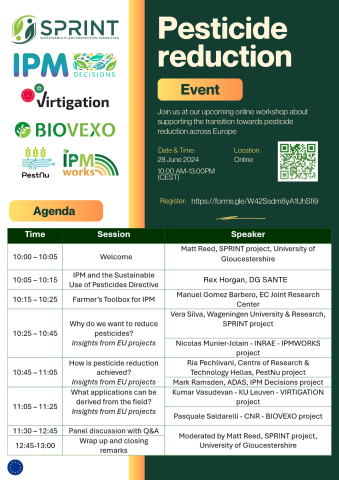The symposium will be introduced by policy experts giving insight into the current EU policy background on the reduction of pesticides.
Project Presentations
The participating projects will give insight into their research and wealth of experience gained by working towards pesticide reduction. Guiding questions of the presentation will be:
- Why do we want to reduce pesticides?
- How is this reduction achieved?
- What applications can be derived from the projects’ work?
Panel Discussion:
The experiences shared by the projects will be discussed by a panel of experts in order to synthesise the quintessential insights from the projects as well as to shed light on the challenges faced by the projects, the research gaps that could be addressed by the next commission as well as the policy needs from the perspective of researchers and practitioners.
The Projects:
PestNu: PestNu aims to revolutionize novel, digital and space-based technologies (DST) with agro-ecological and organic practices (AOP) in a systemic approach.
VIRTIGATION: VIRTIGATION aims to tackle emerging plant viruses in tomatoes and cucurbits through a broad range of solutions, including the IPM cross-protection strategy, biopesticides against virus vectors and plant vaccines.
BIOVEXO: BIOVEXO explores innovative biopesticides, which target the Xylella bacterium. As a response to the increasing Xylella outbreaks in Europe, candidate biocontrol solutions acting against Xylella and its vector are being tested within the BIOVEXO project.
Sprint: SPRINT aims to develop a Global Health Risk Assessment Toolbox to assess impacts of Plant Protection Products (PPPs) on environment and human health, and to propose transition pathways towards more sustainable plant protection
IPMWORKS: IPMWORKS has established an EU-wide farm network demonstrating and promoting cost-effective IPM strategies. Adoption of IPM strategies is promoted through peer-to-peer learning and joint efforts,and demonstrate to other farmers that holistic IPM “works”; i.e. allows a low reliance on pesticides with better pest control, reduced costs and enhanced profitability.
IPM Decisions: IPM Decisions has created an IPM Decisions Platform for decision support in IPM. This web-based platform provides farmers, advisors, researchers and developers with access to DSS and associated resources for consulting, comparing, adapting, and developing IPM DSS across Europe.



